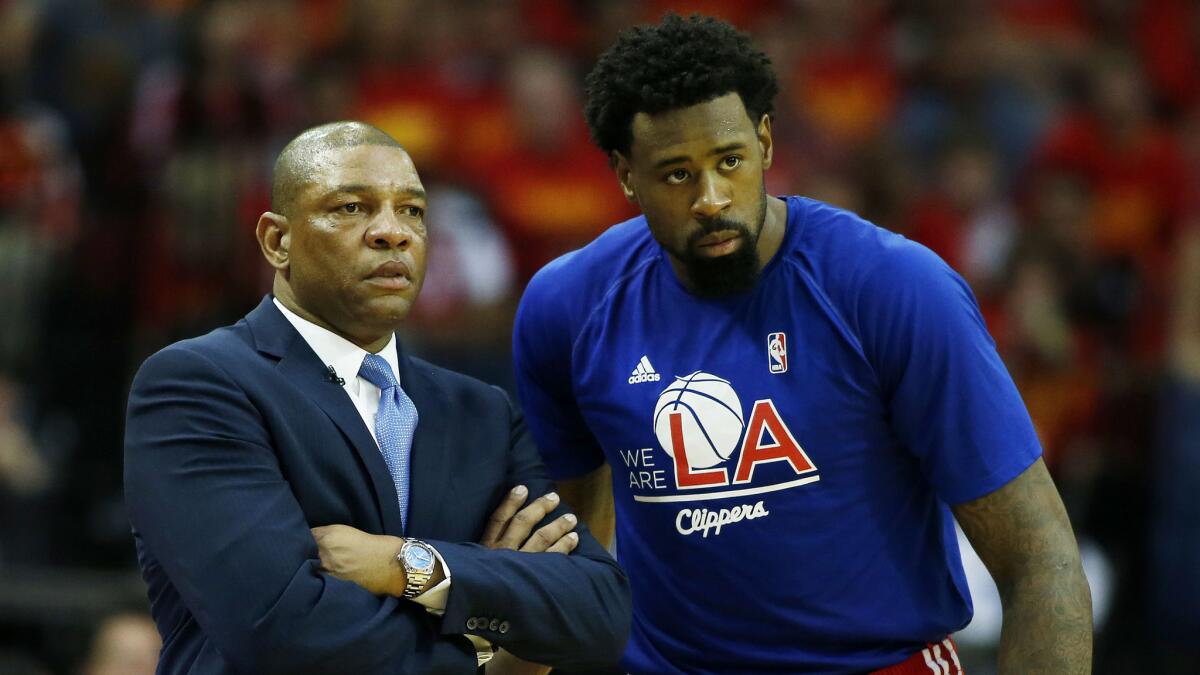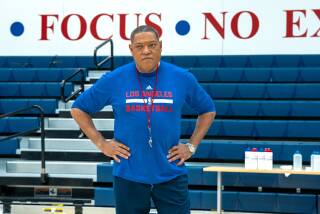Clippers’ DeAndre Jordan faces criticism, but not from Doc Rivers

- Share via
Mark Cuban wasn’t the first NBA executive DeAndre Jordan neglected to tell he wasn’t coming to his team this summer.
Jordan also essentially blew off Clippers Coach Doc Rivers last week when the free-agent center initially committed to join the Dallas Mavericks. Rivers instead heard from Jordan’s agent that his client intended to leave the only NBA team he had known in his seven-year career.
That’s why Rivers said Thursday he wouldn’t blame Jordan for his refusal to inform the Mavericks owner that he had backed out of his verbal pledge and instead re-signed with the Clippers in one of the most dramatic reversals in the history of free agency.
“I can tell you this summer I’ve been turned down more than a freshman kid at a college bar and I have yet to get a call from the actual player to turn me down,” Rivers, who is also his team’s president of basketball operations, said during a conference call with reporters. “It’s always their agent.”
Rivers heard from Jordan himself that he was remaining a Clipper on Wednesday after a contingent of team executives and players hastily trekked to Jordan’s Houston home. The Clippers may not have secured Jordan at “Hello” upon arriving at his doorstep, but they certainly had assurances he was coming back to Los Angeles long before he signed a four-year, $87.6-million contract after midnight Eastern time.
“He still wanted to have the talk with the team and I thought after that was probably when he decided,” Rivers said of Jordan, who departed on a vacation Thursday and could not be reached for comment, “but I don’t know. I’m not in D.J.’s mind. In my gut, it never felt like he wanted to leave.”
Cuban wrote on the messaging app Cyber Dust that Jordan never responded to his attempts to communicate Wednesday but declined to provide his thoughts on Jordan’s backing out of his commitment.
Dallas forward Chandler Parsons, his team’s lead recruiter in its pursuit of Jordan, wasn’t nearly as restrained, calling Jordan “scared,” “unprofessional” and “disrespectful” in an interview with ESPN.com.
“He wasn’t ready to be a franchise player. He was scared,” Parsons told the website. “He was scared to take the next step in his career. There was no other reason other than that he was comfortable and he has friendships there.”
Ironically, a rift between Jordan and Clippers point guard Chris Paul was believed to be one of the reasons Jordan initially decided to leave Los Angeles. Rivers said the relationship between the players was addressed Wednesday, though he downplayed any animosity.
“It’s not as sinister as people keep trying to make this,” Rivers said. “Did we all probably need to have that talk [Wednesday]? Yeah, it was really good and good that everybody was free in their conversation. But it was amazing, it lasted for whatever amount of time, it was over and then they’re playing cards and doing other stuff.”
Rivers chuckled at the notion the Clippers were holding Jordan hostage in his home while waiting for him to sign a contract, describing it as inaccurate. Players and executives came and went as they pleased, Rivers said, amid an almost festive environment that included the playing of video games and the watching of NBA summer league games on television.
Rivers even made calls in an attempt to fill the remaining open spots on his team’s roster.
“D.J. left the house a couple of times,” Rivers said. “It wasn’t like, ‘Deej, you can’t leave the house!’ I mean, none of that stuff happened.”
Clippers owner Steve Ballmer was involved in the team’s re-recruiting efforts but was relatively understated in his approach, Rivers said, letting other members of the traveling party do much of the talking. Paul, Blake Griffin, J.J. Redick and Paul Pierce all spoke in an attempt to let Jordan know how much they wanted him back on their team.
Feeling wanted, Rivers said, was among the reasons Jordan initially committed to the Mavericks after they wowed him over dinner and a formal pitch meeting. Rivers alluded to mistakes he believed he made in his initial recruitment of Jordan, saying he had to figure out how to rectify them after Jordan informed his coach early this week that he was having second thoughts about his decision to join the Mavericks.
Ultimately, Rivers said, he felt Jordan stayed with the Clippers because of the growth he experienced while becoming one of the NBA’s top defenders and rebounders in the last two years under Rivers; a style of play that suited his strengths; the relationships he had built in the organization; and a slew of talented teammates that gave him a chance to contend for a championship.
Rivers also dismissed speculation that Jordan was fixated on his spot in the pecking order of his team’s stars, intimating that he was satisfied being one of the Clippers’ Big Three.
Jordan’s rare but not unprecedented decision to renege on a commitment sparked widespread discussion about potential changes to the NBA’s moratorium period in which free agents are allowed to make nonbinding pledges to teams.
Stu Jackson, formerly the NBA’s vice president of basketball operations, tweeted that the period was too lengthy and could be moved back, but any changes do not appear imminent; the league’s moratorium in 2016 will be 10 days, two days longer than the one this year.
Rivers pointed out that, despite appearances to the contrary, Jordan never left the Clippers.
“Looking at different situations and being recruited, sometimes you can get enchanted with it all and there’s nothing wrong with that,” Rivers said. “But when that happens you also have the right to look at it again, and change your mind, and that’s what he did.”
Twitter: @latbbolch
ALSO:
Rose Bowl’s snub of NFL further complicates temporary stadium issue
Novak Djokovic reaches Wimbledon final with defeat of Richard Gasquet
Former Alabama, Raiders quarterback Ken Stabler dies at 69
More to Read
Go beyond the scoreboard
Get the latest on L.A.'s teams in the daily Sports Report newsletter.
You may occasionally receive promotional content from the Los Angeles Times.







